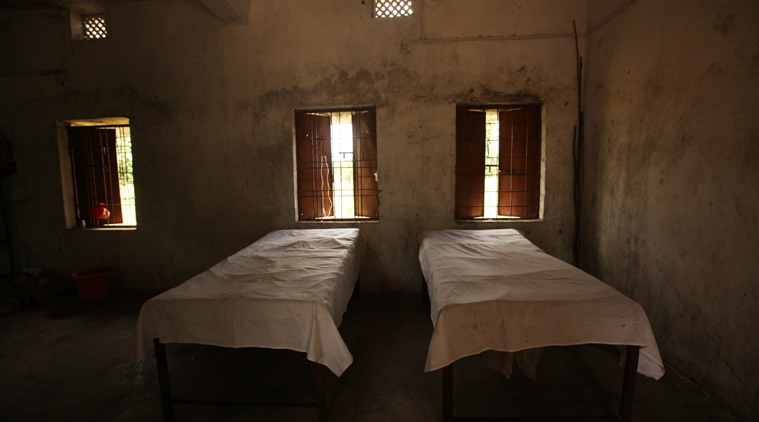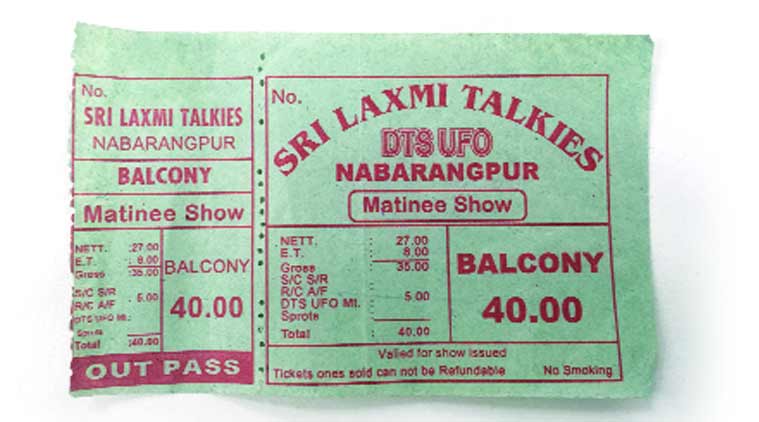Three corners of Nabarangpur, arguably India’s poorest district, three stories of living and leaving. Reports by Ajay Shankar. Photographs by Neeraj Priyadarshi
ANCHALA
Fearing the ‘cruel employer’, she breaks down: ‘Will my son ever come back?’
UNDER the gloomy sky over a cluster of brown mud houses, in a village 75 km to the north of Nabarangpur municipality, an aged mother’s tired eyes start to fill with tears as she talks about her son. “Will he ever come back?” she asks, sitting on the edge of a charpoy. The crowd gathered around her is silent — some shuffle their feet, exchange nervous looks.
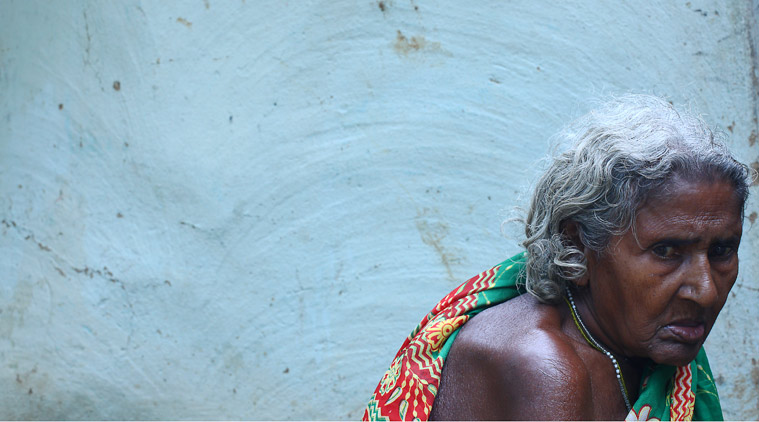 A mother’s wait: Saraswati Mali, in her 80s, whose son Udaychand left home this January. When the others returned, he didn’t come back. Her granddaughter’s number is scribbled on the wall — just in case there is news. (Source: Express photo by Neeraj Priyadarshi)
A mother’s wait: Saraswati Mali, in her 80s, whose son Udaychand left home this January. When the others returned, he didn’t come back. Her granddaughter’s number is scribbled on the wall — just in case there is news. (Source: Express photo by Neeraj Priyadarshi)
In Anchala, the village of migrants, somebody leaves every year, somebody waits. “This has been happening for 15 years,” says Narendra Naik, an unofficial spokesman and a former gram samiti member of this Adivasi enclave.
“Every January, after the maize crop is harvested, around 10-15 people leave for work in places like Chennai, Bangalore, Hyderabad and even towns far south in Kerala whose names we can’t pronounce. They return when the monsoon starts in June,” says Naik.
Watch Video (App users click here)
As the others nod their head, Naik estimates at least 200 people from this village of around 300 families have travelled to other states for work over the years. Some return with small wads of cash hidden in their bags, like Roopchand Kamar, 38, who spent six months this year “loading mud on lorries” in Peddapalli, now in Telangana, and pocketed Rs 15,000. Today, his shy, five-year-old daughter Savitri proudly points to the Dish TV antenna on top of their house.
READ: District Zero Nabarangpur: Why this is the heart of a changing India

Others return with bitter memories, like Dhaniram Pujari, 50, who was “forced to eat boiled paddy waste” and made to work on a construction site near Hyderabad till his “legs almost broke”. He escaped with just the train fare in his pocket. And then, there are those like 80-year-old Saraswati Mali’s son Udaychand, who don’t return.
Watch Video (App users click here)
As Udaychand’s wife Mangaldei looks on stoically, Saraswati explains through Naik that her son and their neighbour, Dhansingh Bhatra, were detained by their “cruel employer” at a construction site in Bellary, Karnataka.
“Nobody knows why they have been held but this usually happens when the employer wants the worker to stay on for a few months more or doesn’t have money to pay his dues,” says Naik.
“Most people who have worked outside (the state) once don’t go back. They are kept like cattle, never get the promised money and are looted by the agents who take them,” he says.
“But then, a new batch is lured by the agents’ promises and the stories of those like Roopchand,who was lucky to get a good employer. And the tamasha starts all over again. They leave quietly by bus to Visakhapatnam and take the train,” Naik adds.
READ: District Zero: One night in a village that sets with the sun
Mangaldei isn’t surprised her husband left. “We were tired of the daily hardship and wanted to make some money and to repair our house. With my husband stuck now, we survive on whatever I get as a labourer.” “We are so poor, you can’t blame them,” says Naik.
Most of the villagers are unschooled, and Mangaldei has got someone to etch the mobile number of her married daughter in a jagged scrawl on her mud wall — just in case there is news. Asked about government schemes, such as the MNREGA, Naik shakes his head. “We have to wait for months to get our money, and then have to pay cuts to everyone down the line. If we don’t do that, they reject our work, saying you dug four inches, instead of six, and so on,” he says.
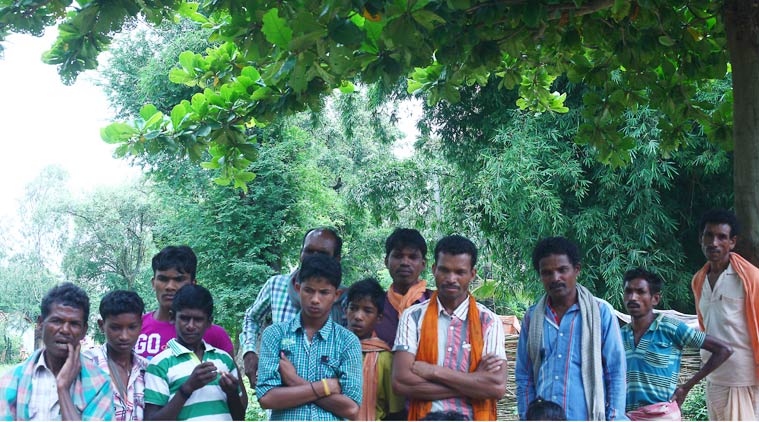 Every January, for the last 15 years, 10-15 villagers leave for other states for work. They return when the monsoon starts. (Source: Express photo by Neeraj Priyadarshi)
Every January, for the last 15 years, 10-15 villagers leave for other states for work. They return when the monsoon starts. (Source: Express photo by Neeraj Priyadarshi)
The sarpanch of the Sunabeda gram panchayat, which includes Anchala, agrees. “The scheme is good and has helped a lot of people. But there is almost always a delay in getting the money, from six months to a year,” says Nilavati Pujari.
Asked about Anchala, which is part of his constituency, the BJD’s Umerkote MLA, Subash Gond, almost flies into a rage. “Will you please ask them why they keep going to other states again and again? We have told them so many times not to. Kaam ke bahane ghoomne jaate hain (They go sightseeing on the pretext of going for work). Some even get lost. They should send their children to school instead, and get them educated for their lives to improve,” Gond says.
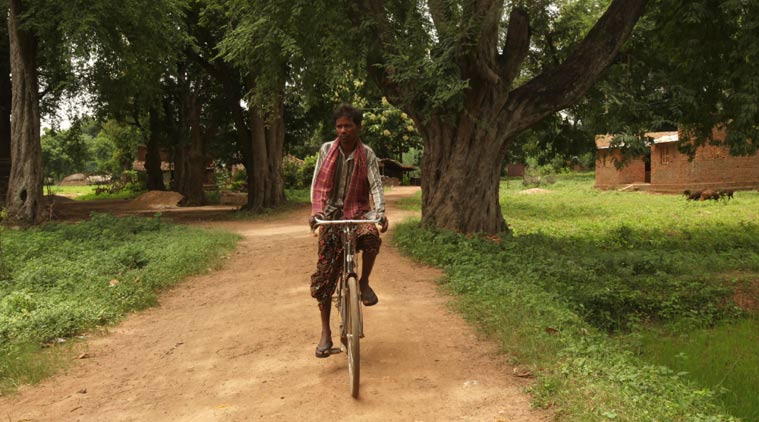 Man cycling in Anchala district. (Source: Express photo by Neeraj Priyadarshi)
Man cycling in Anchala district. (Source: Express photo by Neeraj Priyadarshi)
That’s easier said than done though in a district with an average literacy rate of 46.43 per cent at last count, in the 2011 census. “But don’t worry,” adds Gond, “we will do our best to help them.” Meanwhile, a mother waits.
DEOBANDH
Near MP’s village, it’s the pharmacist who doubles up as doctor
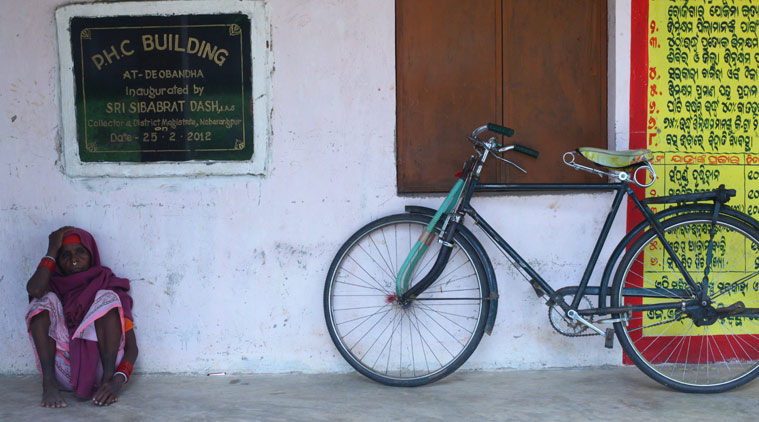 Primary Health Centre in Deobandh. (Source: Express photo by Neeraj Priyadarshi)
Primary Health Centre in Deobandh. (Source: Express photo by Neeraj Priyadarshi)
JUST 1.5 km from Phataki, the village of Nabarangpur BJD MP Balabhadra Majhi, there is a Primary Health Centre only three years old. Painted in pink, it is one of the 40 two-bed PHCs in the district. There’s just one problem though, actually two: the Deobandh PHC has no doctor, it has no electricity.
And so, the local residents, among them the MP’s brother and his family, rush for a quick tablet, an injection, a prescription, or even a stitch or two to Satyadeb Munda, the 37-year-old pharmacist and leader of a two-member medical army that also includes the Auxiliary Nurse Midwife (ANM).
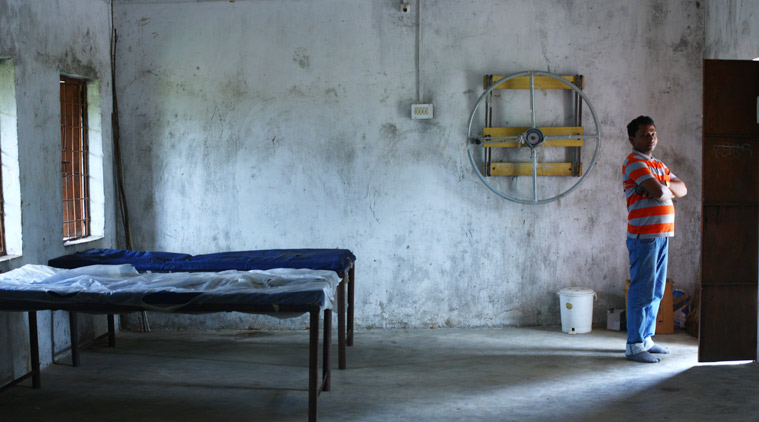 For lack of 2 electricity poles: Pharmacist Satyadeb Munda stitches wounds, writes prescriptions, and figures out how to store medicines and sterilise equipment without power. (Source: Express photo by Neeraj Priyadarshi)
For lack of 2 electricity poles: Pharmacist Satyadeb Munda stitches wounds, writes prescriptions, and figures out how to store medicines and sterilise equipment without power. (Source: Express photo by Neeraj Priyadarshi)
MP Majhi admits the situation is “embarrassing”. “The lack of doctors in rural areas is a problem we face in Odisha. But how will you get a doctor to stay there if there’s no electricity? I have repeatedly requested the authorities to provide a connection. There is power in the area, I was told they are waiting for sanction for two electricity poles,” Majhi tells The Sunday Express.
As for the lack of a doctor, the Chief District Medical Officer of Nabarangpur, Dr Niranjan Nayak, confirms that of the 159 sanctioned posts for government doctors in the district, only 45 have been filled — roughly one doctor for its 27,000 people.
“This is a major challenge in the health sector. The state government regularly posts doctors to these rural areas. But no one is willing to stick on,” says Dr Nayak. “At the district headquarters hospital, we have sanctioned posts for 36 doctors. Twenty-seven are vacant.”
Watch Video (App users click here)
B K Mohapatra, Executive Engineer, Southern Electricity Supply Co of Odisha Ltd, won’t comment on a specific case, but says “a second line is being laid in the MP’s village”. The Deobandh PHC deals with around 40 patients every day, 40 cases of malarial fever every month, and even a couple of cases of “bear attacks” every three months.
Pharmacist Munda soldiers on for almost seven days a week, including half-days on weekends, with a stethoscope around his neck and a prayer on his lips. At the slightest hint of trouble, the B.Pharm degree holder from SCB Medical College in Cuttack refers patients to the Community Health Centre in Chandahandi, 13 km away, which has the only doctor in the entire block.
“Two doctors were posted to this PHC, one after the other, in the last three years. Both came after completing their MBBS degrees, spent a few months till they cleared their PG entrance exams, and left. The last doctor left in January 2014,” says Munda, attending to a bike accident victim whose bleeding scalp needs to be bandaged.
Pointing to the lack of electricity, he adds, “We can’t store medicines and we sterilise equipment on a gas stove. Look, we have the switches, power sockets, everything, but no power.” As a pharmacist, his job is to provide medicines, Munda says. “But here, I apply dressing on wounds, write prescriptions, stitch wounds. I have stitched wounds standing on the verandah because of the lack of light inside on cloudy days.”
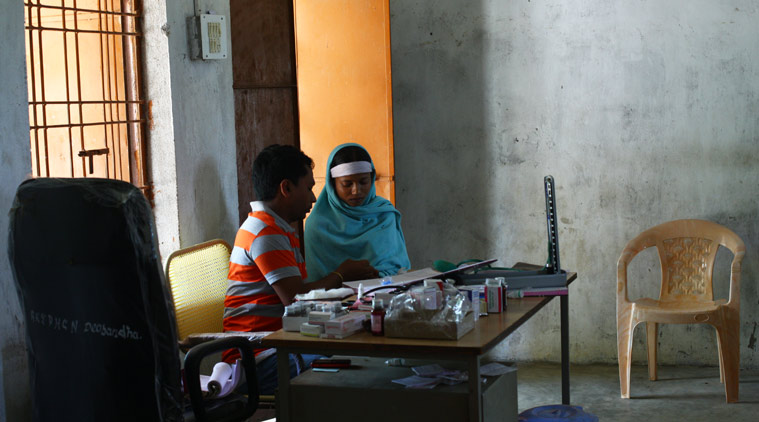 At the Deobandh PHC, the empty doctor’s chair. The entire block has only one government doctor, the district ratio being one doctor for 27,000 people. (Source: Express photo by Neeraj Priyadarshi)
At the Deobandh PHC, the empty doctor’s chair. The entire block has only one government doctor, the district ratio being one doctor for 27,000 people. (Source: Express photo by Neeraj Priyadarshi)
Munda works in one hall, with a cupboard, a rack, two tables, two chairs, a physiotherapist’s exercise wheel nailed to the wall, and an empty doctor’s chair. “I have living quarters too, but how can we stay here without electricity? Then, there is the fear of bears. We treated a bear attack victim just last month,” says Munda, who is from Keonjhar, about 600 km away. He, his wife and a schoolgoing daughter stay in Chandahandi.
Munda is a contractual employee designated “regular against”, which means he will be made a permanent staffer in six years, out of which he has completed three. But on the other side is Lakshmipriya Mallick, the ANM, who is “just a contract employee”, which means she lives on hope from one year to the next. Then there’s a male sweeper “donated by the village”.
“According to rules, this PHC should have a doctor, a staff nurse, a pharmacist, an attendant and two sweepers. But here, the two of us and the sweeper do our best to ensure that we can help the people around us,” says Munda. “After all, it’s the MP’s village.”
DISTRICT HEADQUARTERS
Lone cinema hall waits for Akshay Kumar
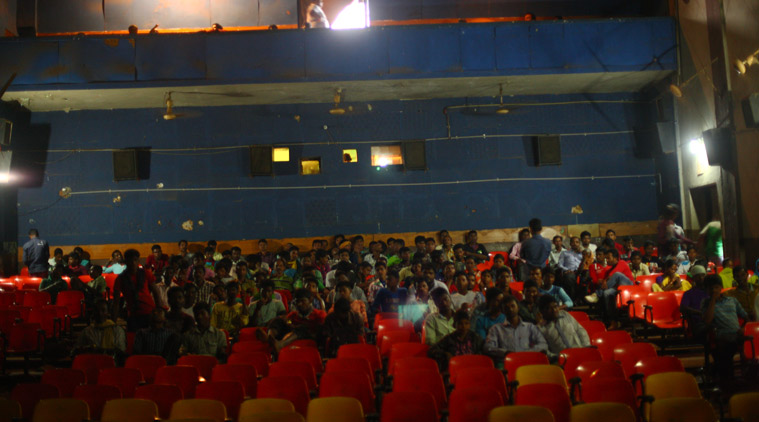 People gathered for a show in Sri Laxmi Talkies. (Source: Express photo by Neeraj Priyadarshi)
People gathered for a show in Sri Laxmi Talkies. (Source: Express photo by Neeraj Priyadarshi)
FLIPPING through the empty pages of an old diary, surrounded by Hindu gods and Odiya film stars frozen in various poses, three spiders perched on a sagging cobweb high over his head, M Santosh Kumar is waiting for Akshay Kumar to save him. “I had hoped for Salman Khan, but we didn’t get Bajrangi Bhaijaan. Now I am waiting for Akshay Kumar’s Brothers on Independence Day,” says Kumar.
Until then, the 35-year-old who runs Sri Laxmi Talkies, the “only cinema theatre in Nabarangpur district”, will have to manage with Super Michua (super liar), starring Babusan and Jhilki. It’s a tense wait. For, it’s 1 pm on August 3, an hour to go for Sri Laxmi Talkies to come alive again after shutting down on June 19 due to “maintenance problems”. And Kumar is desperately hoping that Super Michua, the Odiya entertainer, will set the stage for the future.
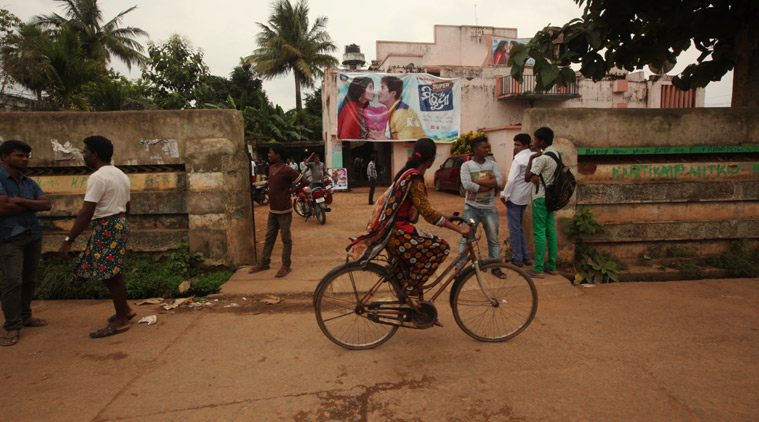 Countdown to super michua: The hall shut down in June for maintenance. Owner Santosh Kumar had to settle for an Odiya film for opening. (Source: Express photo by Neeraj Priyadarshi)
Countdown to super michua: The hall shut down in June for maintenance. Owner Santosh Kumar had to settle for an Odiya film for opening. (Source: Express photo by Neeraj Priyadarshi)
“I will not lose this battle. I know more people are watching movies on DVDs at home or at cineplexes. But my audience, the Rs 30-per-ticket wallah, will remain with me. This is a district of the poor, and most of the people who come here are from the tribal areas. For them, a visit to my talkies is a way of relaxing after a busy day in the market,” says Kumar, brightening up finally inside his makeshift office, a small room with high walls painted in pale green.
Kumar’s confidence, however, is not reflected in his leased property, located on a narrow alley behind a busy market at the centre of the district headquarters. Sri Laxmi Talkies, 15 years old and 440 seats big, is in terminal decline — except for the red plastic seats in the Rs 30 deluxe class on the ground floor and the satellite receiver in a corner of the projection room.
The original projector is a mangled metal mess in one corner, the iron grills on the gate are coming apart, the giant fans are rusting, the cement walls are crumbling, and the 40 seats on the small slip of a balcony — Rs 40 per ticket — are hard and uncomfortable. “But we are up to date with technology,” says Kumar, pointing to the receiver which downloads the movie from the satellite feed provider — a company called ‘UFO’, in the case of Super Michua.
With about 45 minutes to go for the 2 pm show to start, the first group of Kumar’s audience ambles in — all men, a Mohawk cut, a CSK T-shirt, a Bajaj bike, a whispered wisecrack and a nervous giggle.
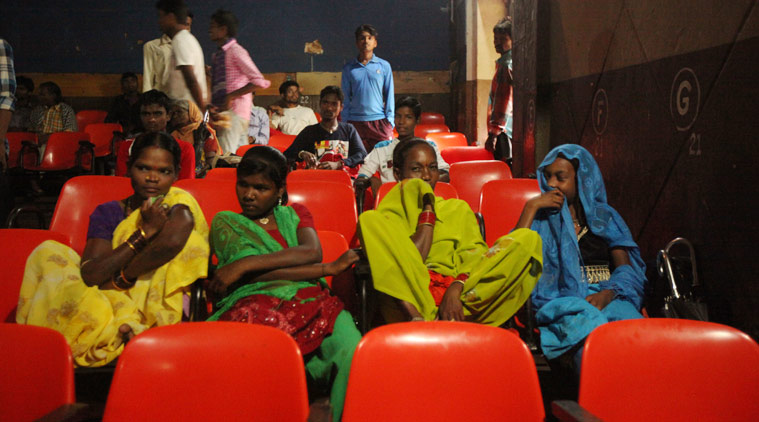 With 15 minutes left for the show, the audience has crossed 50. Kumar, who spends Rs 40,000 for running the hall per month, can’t stop smiling. (Source: Express photo by Neeraj Priyadarshi)
With 15 minutes left for the show, the audience has crossed 50. Kumar, who spends Rs 40,000 for running the hall per month, can’t stop smiling. (Source: Express photo by Neeraj Priyadarshi)
“We’ve been waiting for the theatre to open,” says Partap Sindhu, a Bhatra tribal and a 15-year-old student at the government school nearby. “Where else do we go after skipping classes?” he adds, laughing. “It’s the only time I can forget everything,” says Surjan Lal, 52, a civil contractor whose story could easily have been a part of the “countless movies” he has watched here. Lal is a former BSF jawan from Jodhpur who claims he quit in a fit of rage after “an officer, about 25 years old, young enough to be my son” called him over, snapping his fingers at him and referring to him as “beta”.
“Today, I am a wandering soul, doing odd jobs so that I can send money to my family,” he says, his voice trailing off.
With 15 minutes left for the show, the audience has crossed 50. There’s even a tussle at the ticket counter where Kumar’s cousin, 30-year-old Tejeshwar Rao, sits tearing out tickets under a solitary bulb. “This is good,” says Kumar. “I have to pay Rs 20,000 per month to the owner of this land. My salary bill for the eight people I have employed is about Rs 20,000 per month. Where is the money going to come from?” adds Kumar, a “local” from Andhra, who has two schoolgoing children.
Pointing towards a small “canteen” on the side, he says, “That’s there only because every theatre needs one, right? It gets me Rs 50 every day, not even enough to pay the electricity bill for that room.” Kumar is cut short by a loud buzz as the doors open. It is 2.15 pm, the lights dim, the cinema is about to begin. The first image on the screen is a logo of the satellite feed provider ‘UFO’. It’s greeted by a single, piercing whistle.


